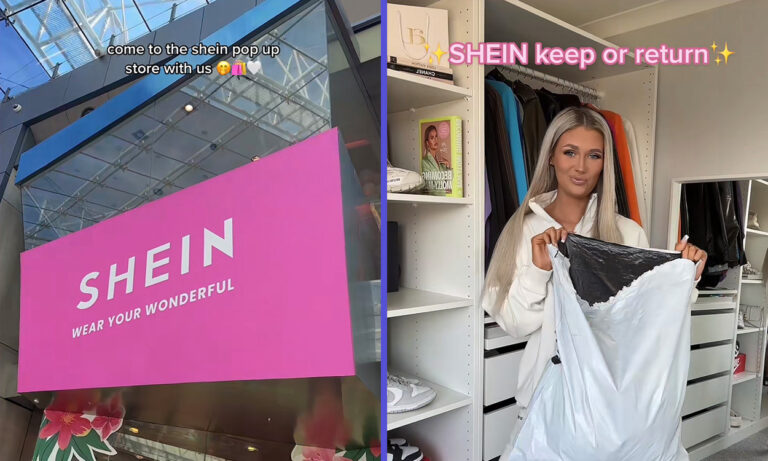The fight against fast fashion continues as SHEIN boosts revenue and opens 30 stores worldwide
The multi-billion dollar Chinese clothing company, SHEIN has officially announced plans to open 30 stores in the UK, Europe and the Middle East. The notorious fast fashion brand has been on a mission to destroy all hopes for a sustainable fashion future, so yes, it’s time to grab the tissues and open up the floodgates.
@twinscott Welcome back to another episode of shitty things Shein are doing 🙂 #gcds #morsoheels #giulianocalza #shein #fastfashion #designtheft
♬ original sound - Scott Staniland
In the past, SHEIN has hosted pop-up shops across the UK, including places like Birmingham, Cardiff, and Bristol. Now, with its UK headquarters in Dublin, Irish city Cork has also fallen victim to SHEIN’s crimes. Shoppers hit the streets and queued for over four hours to gain access to the pink-clad storefront hoping to avoid the two week delivery wait from the brand’s website.
View this post on Instagram
Sadly, the label shows no signs of slowing down—it’s called fast fashion for a reason. Business of Fashion recently reported that despite SHEIN’s value falling by almost $40 billion dollars from $100 billion in the last year, revenue is still expected to grow by 40 per cent in 2023.
This should come as no surprise as, similarly to elder cousin PrettyLittleThing (PLT), SHEIN has been accused of overworking and underpaying its workers. Channel 4 went undercover to find out just how badly SHEIN was treating its workers, concluding that workers were paid 4,000 yuan (£457) to make 500 pieces of clothing a day. Working 18-hour days with only one day off a month and facing salary cuts for their errors—makes jumping on the tube for the morning commute after a bank holiday weekend look easy.
Launched in 2008, SHEIN employs a polarising fast fashion model, much like its competitors PLT and Boohoo. By constantly producing new collections at low cost and quality, the brand is continuously renewing stock, attracting new customers as well as providing SHEIN-fiends with an incentive to revisit its site.
Named the most popular brand of 2022 and Google’s most searched for label (according to Vogue), why is SHEIN so popular despite the current climate crisis?
In a cost of living crisis, the smaller price tags are attractive. A lot of the time, shopping sustainably is a privilege exclusive to the wealthy. Small independent brands are inherently more expensive because they have smaller teams, manufacturing takes longer and uses more sustainable, costly fabrics. However, this doesn’t mean that those who aren’t raking in millions want to miss out on the latest trends, so they’ll often turn to SHEIN for far less spenny dupes.
View this post on Instagram
SHEIN was one of the few beneficiaries of the COVID 19 pandemic, raking in $10 billion in revenue in 2020 alone. Naturally, to combat lockdown boredom, TikTokers would share SHEIN hauls promoting unnecessary over-consumption. Two years later, and those countless hauls (containing bundles of unloved clothes) have now ended up on charity shop racks or worse, the local landfill.
@flaviemartin 😍😍 #haulshein #shein #haul2023 #outfitshein #totallook
♬ People - Libianca
With SHEIN stores opening worldwide, the fast fashion empire continues to grow—and so does the threat it poses to our environment. Rather than using TikTok to share excessive hauls, let’s call out SHEIN and its peers to change how they operate. It’s not a SHEIN versus Depop girlies situation, it’s about uniting to tackle the climate crisis and standing up for underpaid workers.





